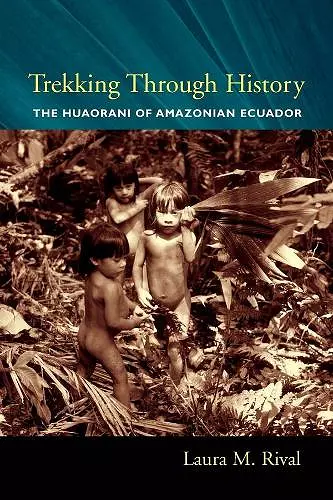Trekking Through History
The Huaorani of Amazonian Ecuador
Format:Paperback
Publisher:Columbia University Press
Published:22nd Nov '02
Currently unavailable, our supplier has not provided us a restock date

The first description of Huaorani society and culture according to modern standards of ethnographic writing. Through her detailed comparative discussion of native Amazonian representations of history and the environment, Rival illustrates the unique way the Huaorani have socialized nature by choosing to depend on resources created in the past-highlighting the unique contribution anthropology makes to the study of environmental history.
The Huaorani of Ecuador lived as hunters and gatherers in the Amazonian rainforest for hundred of years, largely undisturbed by western civilization. This book provides description of Huaorani society and culture according to modern standards of ethnographic writing.The Huaorani of Ecuador lived as hunters and gatherers in the Amazonian rainforest for hundred of years, largely undisturbed by western civilization. Since their first encounter with North American missionaries in 1956, they have held a special place in journalistic and popular imagination as "Ecuador's last savages." Trekking Through History is the first description of Huaorani society and culture according to modern standards of ethnographic writing. Through her comprehensive study of their extraordinary tradition of trekking, Laura Rival shows that the Huaorani cannot be seen merely as anachronistic survivors of the Spanish Conquest. Her critical reappraisal of the notions of agricultural regression and cultural devolution challenges the universal application of the thesis that marginal tribes of the Amazon Basin represent devolved populations who have lost their knowledge of agriculture. Far from being an evolutionary event, trekking expresses cultural creativity and political agency. Through her detailed comparative discussion of native Amazonian representations of history and the environment, Rival illustrates the unique way the Huaorani have socialized nature by choosing to depend on resources created in the past-highlighting the unique contribution anthropology makes to the study of environmental history.
Rival's fascinating ethnography demonstrates that ecological adaptation cannot be understood as resource extraction alone, it is deeply embedded in Huaorani identity, sociality, symbolism, and historicity... Rival's work represents an important contribution to this developing approach. -- Loretta Cormier Journal of Ethnobiology A superb job in addressing issues of native historicity. -- Michael A. Uzendoski Latin American Research Review [Rival's] rich ethnographic analysis and theoretical discussion provide key arguments and materials to re-think further Amazonian people's relationships to the environment. -- Luisa Elvira Belaunde, University of St Andrews Royal Anthropological Institute
ISBN: 9780231118453
Dimensions: unknown
Weight: unknown
256 pages